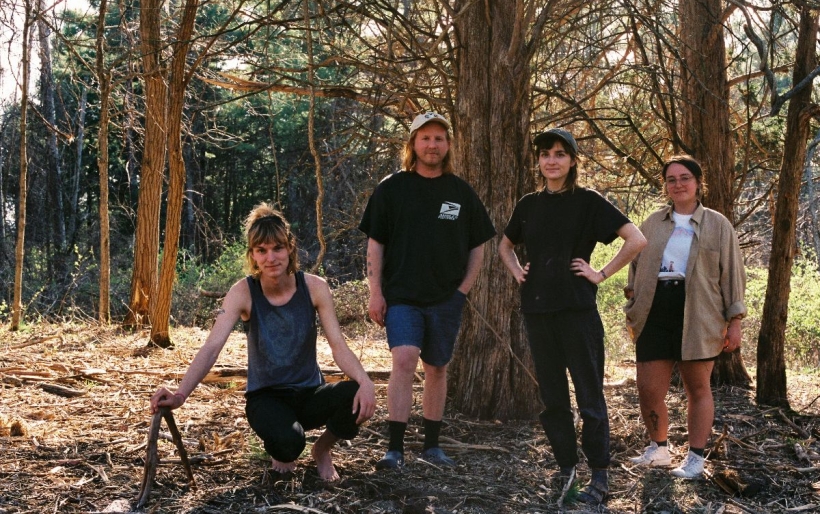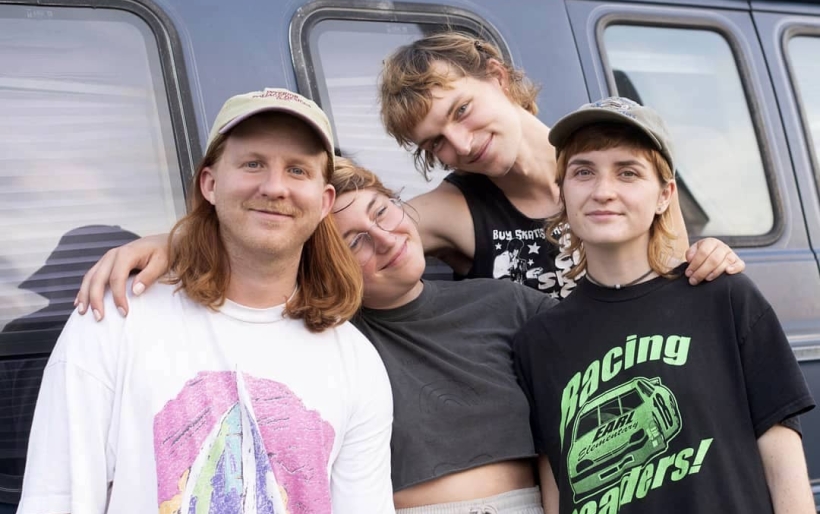It’s here where I must take a minute to introduce Heather Jones. Jones, in many ways, seemed to serve as a fifth member of the band, not only serving as engineer for the record but as a helping hand throughout the process. Jones was also a friend and collaborator for years previous to the recording, helping, again, to solidify Sadurn as a group where trust and friendship serve as important touchstones. Jones transformed what was your run-of-the-mill Pocono AirBNB into a makeshift studio, allowing Sadurn to make the best album possible without the pressures of a more typical studio environment. “I can’t imagine doing it any other way,” says Swain. “Being in the cabin together was such a big part of the process.”
Heading up to an AirBNB for two weeks with relative strangers is a whole different prospect than spending two weeks working on an album with friends, for a lot of reasons. Any creative endeavor performed in a group setting will surely lead to disagreements, both minor and major, but pushing through those differences is what separates fulfilling environments from more toxic ones. Of course, things are never totally seamless. There were moments where tensions ran a bit higher than others, especially as the band fully fleshed out the songs’ arrangements. This is where the fact that Sadurn is a band built on friendship can become a bit of a mixed blessing. As we all know, loved ones are often able to touch on our most sensitive soft spots, whether they mean to or not. “It is mostly easier but there are things that are tougher about it,” says Jones of the almost familial relationships within the band, though she wouldn’t really have had it any other way. “Maybe emotions will get high, but it will ultimately lead to discussion and collaboration. There is something really special about making a record with people you love. I wouldn’t trade that for anything in the world.”
Sadurn spent over two weeks in “the cabin,” as it came to be called. These were long days full of hard work. Things were not always easy or seamless or fun but you get the sense that, above all else, it was an incredibly rewarding experience for all involved. Let’s not forget the importance of timing here as well. After months of quarantine and isolation, these five friends were able to not only express themselves creatively but emotionally as well, something they hadn’t gotten to do in some time. In between hours of arranging and writing, full-band tracking, recording and re-recording, there were pillow forts, home movies and the kind of aimless joy you can only experience around close friends. “I think it was really nice that we all got to spend a bunch of weeks together,” says Jones. “It was a dream, honestly.”
Maybe I Am Frightened of What Happens If I Start Saying What I Have Been Thinking
“This shit is so vulnerable,” says DeGroot late into our second conversation. In almost every review or description of Sadurn, the first thing people mention are the lyrics, and it makes sense. The spare, unadorned arrangements, the delicate vocal delivery, the honey-sweet production, it all puts focus on DeGroot’s words. And as much as they seem reluctant to talk too much about the specifics involved, the lyrics are themselves diaristic and, frankly, pretty captivating. “I know my fault is that I speak every damn thought in my mind,” they sing on album opener “Snake,” a kind of dual mission-statement and self-effacing apology. Later, on “White Shirt,” things become less straightforward, but no less evocative. “And I found you smoking in the park, you had no idea you’d dragged me through the dark,” they sing, a story forming from the border of those two lines alone. “Moses Kill” might be the most vulnerable, though, a nakedly exposed admission of defenselessness. “And if you say you don’t like what I brought before you, then all my cards are on the ground,” sings DeGroot, before adding. “And you were looking smaller than I had ever seen you, and I never really made you proud at all.” In merely two verses “Moses Kill” gives a view, though murky and shadowed, of wounds fresh and scarred.
I get the sense that writing these kinds of emotionally bare songs is not much easier than talking about them. Several songs on the record, DeGroot admits, led to tough conversations with those involved in their most specific references. In fact, the only reason much of Radiator exists at all is because they fooled themselves into vowing never to share the songs with anyone. “When you start to write a song with no intention of anyone hearing it, it takes the pressure off, it makes it easier,” they say. “But then I’m left with the song that I actually want to share.” This makes for a kind of double-edged sword. Yes, these songs can sometimes feel like, in their words “an overshare,” but without the outlet, these thoughts and feelings would be left to linger, unresolved.
That’s not even to mention all the people hearing DeGroot’s words, and finding solace within them. “can’t quite explain how this song found me just when I needed it and helped me feel everything I needed to feel, carrying this one into the future with fond emotion,” said a user on YouTube commenting on the band’s video for “Snake.” “A few days ago I heard this song, and needed it. It’s only been a few days, but I’ve since signed up for group therapy, seeked the friends and help I needed, cleaned my space, signed up for classes, and feel much better. I know the song didn’t do those things, I did, but the song has been so impactful that I’ve got it on repeat,” commented another.
“You know when you have a feeling or thought and you don’t really have a name for it, you can’t identify it?” asks Jones. “G’s songs have named thoughts or feelings that have sat in my mind for a very long time.”


